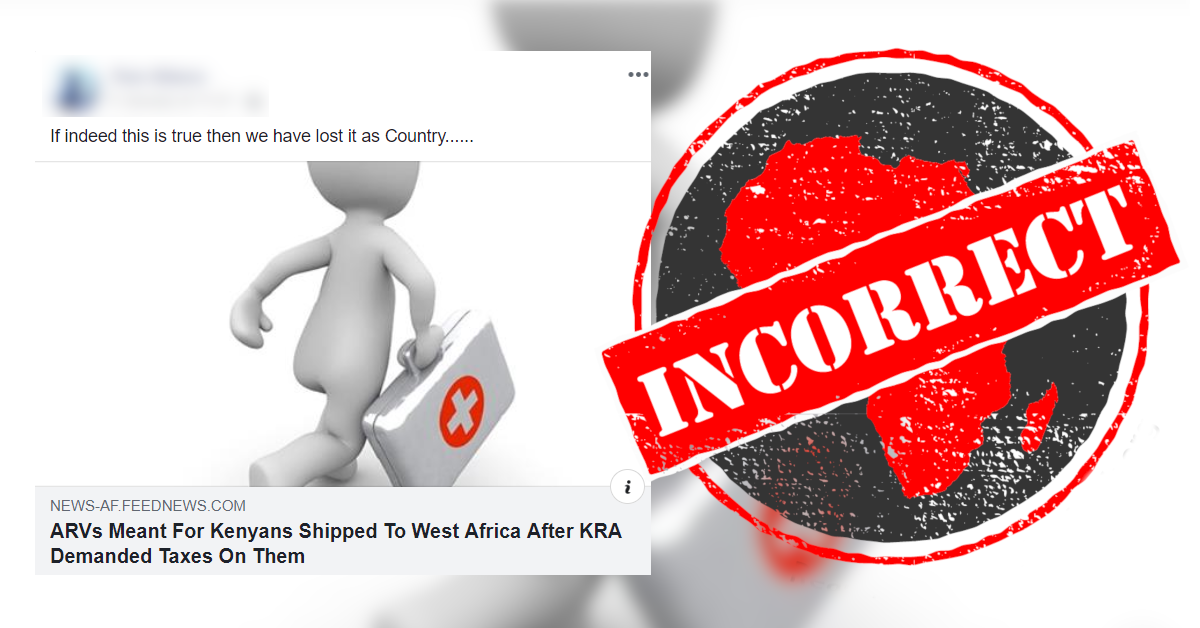“ARVs meant for Kenyans shipped to West Africa after the Kenya Revenue Authority (KRA) demanded taxes on them” reads the headline of an article posted on Facebook.
The article, shared from the news aggregation site Opera News, was first published on Soko Directory on 31 December 2019.
It says USAid, the US Agency for International Development, shipped antiretroviral drugs worth US$35 million to the Kenya Medical Supplies Agency (Kemsa), which falls under the ministry of health.
Antiretroviral drugs, or ARVs, help treat HIV by stopping the virus from spreading in the body.
When the drugs landed in Mombasa in October 2019, the article claims, the KRA slapped taxes on them. But it says the US embassy refused to pay, saying Kemsa should do it. Kemsa also refused, but the KRA stood its ground.
Then, it claims, USAid instructed the shipper to take the drugs to “another country”. Because of this, Kenya has ran out of some types of ARVs, leaving many HIV-positive Kenyans without treatment.
How true is this story? We checked.

On 3 January 2020 the KRA posted a screenshot of the article on Facebook, with “FAKE” stamped on it.
“KRA would like to inform the public that the story running on social media titled ‘ARVs meant for Kenyans shipped to West Africa after KRA demanded taxes on them’ is not factual,” it says in the post.
“KRA wishes to clarify that it has not declined to clear any ARV supplies.”
And Kenya’s ministry of health denied the claims in a 6 January press statement posted on its official Twitter account, which Kemsa retweeted.
“The Ministry wishes to clarify that no single dose of ARV procured by the President's Emergency Fund for AIDS Relief (PEPFAR) through USAID for Kenya, has been diverted to any other country due to non-payment of taxes imposed by the Government,” the statement reads.
Pepfar, the US President’s Emergency Plan for Aids Relief, is the US government’s response to the global HIV/Aids epidemic. It works with USAid.
The ministry added that all health products, including ARVs, procured under Pepfar were free of tax.
And it said it regularly checked Kenya’s stocks of ARVs, in monthly meetings with Pepfar, to make sure there were enough.
The ministry was in the process of buying new stocks of ARVs using Pepfar funding, it said, with the next shipment due “in the beginning of January”. – Grace Gichuhi
The article, shared from the news aggregation site Opera News, was first published on Soko Directory on 31 December 2019.
It says USAid, the US Agency for International Development, shipped antiretroviral drugs worth US$35 million to the Kenya Medical Supplies Agency (Kemsa), which falls under the ministry of health.
Antiretroviral drugs, or ARVs, help treat HIV by stopping the virus from spreading in the body.
When the drugs landed in Mombasa in October 2019, the article claims, the KRA slapped taxes on them. But it says the US embassy refused to pay, saying Kemsa should do it. Kemsa also refused, but the KRA stood its ground.
Then, it claims, USAid instructed the shipper to take the drugs to “another country”. Because of this, Kenya has ran out of some types of ARVs, leaving many HIV-positive Kenyans without treatment.
How true is this story? We checked.

‘Social media story not factual’
On 3 January 2020 the KRA posted a screenshot of the article on Facebook, with “FAKE” stamped on it.
“KRA would like to inform the public that the story running on social media titled ‘ARVs meant for Kenyans shipped to West Africa after KRA demanded taxes on them’ is not factual,” it says in the post.
“KRA wishes to clarify that it has not declined to clear any ARV supplies.”
‘No single dose of ARVs diverted’
And Kenya’s ministry of health denied the claims in a 6 January press statement posted on its official Twitter account, which Kemsa retweeted.
“The Ministry wishes to clarify that no single dose of ARV procured by the President's Emergency Fund for AIDS Relief (PEPFAR) through USAID for Kenya, has been diverted to any other country due to non-payment of taxes imposed by the Government,” the statement reads.
Pepfar, the US President’s Emergency Plan for Aids Relief, is the US government’s response to the global HIV/Aids epidemic. It works with USAid.
The ministry added that all health products, including ARVs, procured under Pepfar were free of tax.
And it said it regularly checked Kenya’s stocks of ARVs, in monthly meetings with Pepfar, to make sure there were enough.
The ministry was in the process of buying new stocks of ARVs using Pepfar funding, it said, with the next shipment due “in the beginning of January”. – Grace Gichuhi
Republish our content for free
For publishers: what to do if your post is rated false
A fact-checker has rated your Facebook or Instagram post as “false”, “altered”, “partly false” or “missing context”. This could have serious consequences. What do you do?
Click on our guide for the steps you should follow.
Publishers guideAfrica Check teams up with Facebook
Africa Check is a partner in Meta's third-party fact-checking programme to help stop the spread of false information on social media.
The content we rate as “false” will be downgraded on Facebook and Instagram. This means fewer people will see it.
You can also help identify false information on Facebook. This guide explains how.


Add new comment